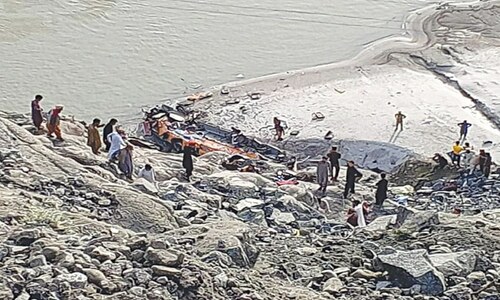ISLAMABAD: The government on Monday reopened border crossings with Afghanistan as a goodwill gesture, but with a hope that Kabul would address its concerns about terrorist sanctuaries on the border.
“Prime Minister Nawaz Sharif has ordered the reopening of the border crossings with Afghanistan,” a statement issued by the Prime Minister Office said days after an ice-breaking meeting between Foreign Affairs Adviser Sartaj Aziz and Afghan National Security Adviser Hanif Atmar in London, which was hosted by Britain.
The decision, although a consequence of the London talks, came after a series of follow-up meetings between the two sides over the past three days.
The closure of the formal crossing points on the 2,600km porous border was ordered by the army immediately after the Sehwan shrine bombing last month. The crossings have remained closed all along except for a two-day relaxation earlier this month for the repatriation of stranded passengers, which benefited about 55,000 people.
Kabul urged to address concerns over militant sanctuaries
The border closure shut down all trade between the two countries, because of which traders on both sides suffered huge losses, but landlocked Afghans bore the brunt. Price hike in Afghanistan caused by the closure badly impacted the ordinary Afghans, resulting in a surge in the already very high anti-Pakistan sentiment.
The situation was feared to escalate into a humanitarian crisis. Economic losses due to the closure, moreover, ran into millions of dollars and Kabul had taken up the matter with the World Trade Organisation, which was scheduled to take it up in the first week of April.
The closure that continued during the recently held Economic Cooperation Organisation summit in Islamabad, which was attended by Afghanistan at a lower level, sharply contrasted with its outcome document in which leaders from 10 regional countries pledged promotion of trade and connectivity linkages.
Afghan Ambassador Dr Omar Zakhilwal said the crossings had been opened by Pakistan “unconditionally”, “fully” and “permanently”. It, however, remained unclear whether Afghans had secured some understanding for not shutting down the crossings in future. Pakistan has on several occasions used the access route as leverage. During last year the routes were closed five times because of differences over border control and coordination mechanism that Pakistan had been pursuing for checking cross-border movement.
Pakistan reflected the same in its statement, which noted that although linkages of recent terrorist acts could be traced back to anti-Pakistan elements based on Afghan soil, the government had decided to immediately reopen the border crossings as a goodwill gesture.
“We expect that Afghan government would take all necessary steps for addressing the reasons that compelled the closing of the crossings,” the statement underscored.
Sanctuaries of the banned Tehreek-i-Taliban Pakistan’s (TTP) and its splinter groups have existed along the border since 2010 when militants fleeing military operations in Swat and Bajaur took refuge there. The Jamaatul Ahrar, which split with the TTP in 2014, moved its bases to Afghanistan after the start of operation Zarb-i-Azb. Several attacks have been carried out in Pakistan from those bases, but the Afghan government has always turned a blind eye to them. Lately, it suggested it could take action against them as a quid pro quo for action against the Afghan Taliban and Haqqani network allegedly based in Pakistan.
Afghanistan has long blamed Pakistan for not taking action against Taliban and Haqqani network sanctuaries on its soil, alleging that this has allowed insurgency there to sustain.
Prime Minister Sharif, besides ordering the border reopening, also assured the Afghan leadership of continued cooperation for peace and stability in Afghanistan and against terrorism.
The closure was widely criticised in Pakistan, where analysts believed that the move was counterproductive.
They said that there might be other reasons for allowing the resumption of cross-border traffic, but the government at least had admitted that the continued closure was against economic and public interests.
The Afghan government welcomed Pakistan’s fresh move.
Ibrahim Shinwari in Landi Kotal adds: Custom clearing agents, transporters, businessmen and even ordinary people sent congratulatory messages to each other on their mobile phones and through social media the moment they heard about the announcement on television channels, but the Torkham crossing could not be opened on Monday.
Jubilation was writ large on the faces of the clearing agents, transporters and taxi drivers who had been rendered ‘jobless’ for almost a month.
Immediately after the announcement, all the stakeholders rushed to the border crossing where they were stopped at the Michni and Shaheed Morr checkpoints for verification and later allowed to proceed up to the Zero Point. Trucks and containers loaded with trade goods and stranded on the Peshawar-Torkham road started moving towards the border hours later.
A sizable number of clearing agents and their staff waited in vain as the officials concerned decided to perform a ritual on Tuesday morning of an exchange of sweets and bouquets with their Afghan counterparts.
Hayatullah Shinwari, the president of the Torkham Custom Clearing Agents Association, told Dawn that he was invited by custom officials to immediately go to Torkham so that clearing of trade merchandise could begin forthwith, but the process could not be initiated as the orders were not formally conveyed to the officials at the border.
“Our excitement soon turned into disappointment as Pakistani border officials refused to open the border for hundreds of anxious Afghans who had gathered for crossing into Pakistan,” he said.
Security officials said the border would reopen on Tuesday morning.
Published in Dawn, March 21st, 2017















































Dear visitor, the comments section is undergoing an overhaul and will return soon.